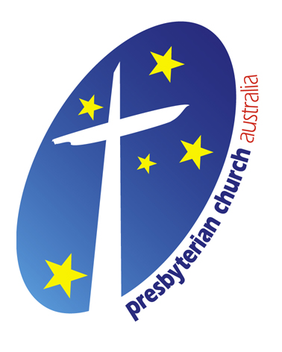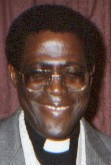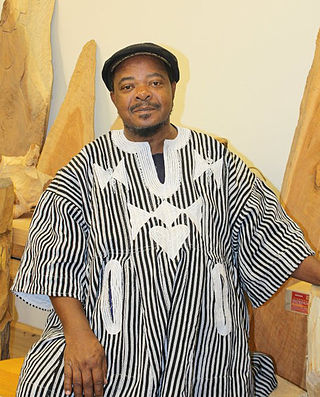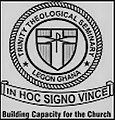Related Research Articles

The Ewe people are a Gbe-speaking ethnic group. The largest population of Ewe people is in Ghana, and the second largest population is in Togo. They speak the Ewe language which belongs to the Gbe family of languages. They are related to other speakers of Gbe languages such as the Fon, Gen, Phla Phera, Gun, Maxi, and the Aja people of Togo, Benin and southwestern Nigeria.

The Presbyterian Church of Australia (PCA), founded in 1901, is the largest Presbyterian denomination in Australia. The larger Uniting Church in Australia incorporated about two-thirds of the PCA in 1977.

The World Communion of Reformed Churches (WCRC) is the largest association of Calvinist churches in the world. It has 230 member denominations in 108 countries, together claiming an estimated 80 million people, thus being the fourth-largest Christian communion in the world after the Catholic Church, Eastern Orthodox Church, and the Anglican Communion. This ecumenical Christian body was formed in June 2010 by the union of the World Alliance of Reformed Churches (WARC) and the Reformed Ecumenical Council (REC).

The Evangelical Presbyterian Church, Ghana is a mainline Protestant Christian denomination in Ghana. It is popularly referred to as the "EP Church". It has strong roots in the Evangelical and Reformed traditions. The denomination's Presbyterian sister church is the Presbyterian Church of Ghana.

Protestantism in South Africa accounted for 73.2% of the population in 2010. Its history dates back to the initial European settlement on the Cape of Good Hope in 1652. Since then, Protestantism has been the predominant religion of the European settlers and today, of South Africa as a whole.

Christianity is the largest religion in Ghana, with 71.3% of the population being member of various Christian denominations as of 2021 census. Islam is practised by 19.9% of the total population. According to a 2012 report by Pew Research, 51% of Muslims are followers of Sunni Islam, while approximately 16% belong to the Ahmadiyya movement and around 8% identify with Shia Islam, while the remainder are non-denominational Muslims.

Francis Amenu (born ?) is a Ghanaian metallurgical engineer who also trained and ordained as a minister. He served in the Evangelical Presbyterian (E.P.) Church, Ghana. In 1999, he was assigned to serve Ghanaian congregations in London, United Kingdom. There in 2003, before returning to Africa, he founded the E.P. Church, UK.

Cephas Yao Agbemenu is a Ghanaian Art Professor who teaches at the Kenyatta University in Nairobi, Kenya. He is a sculptor and a traditional African wood carver who sees parallels between his carvings and life.

The arrival of the Europeans in 15th century into the then Gold Coast brought Christianity to the land. There were many different cultural groups across the West African region who were practicing different forms of spirituality. As the Europeans explored and took control of parts of the country during the colonial days, so did their religion. Christianity is the religion with the largest following in Ghana. Christian denominations include Catholics, Methodists, Anglicans, Presbyterians, Lutherans, Seventh-Day Adventists, Pentecostals, Baptists, Evangelical Charismatics, Latter-day Saints, etc.

The Christian Council of Ghana (CCG) is an umbrella group that unites 31 churches and denominations in Ghana. The council has its members from Charismatic, Pentecostal, Orthodox and other churches.

The Presbyterian Church of Ghana is a mainline Protestant church denomination in Ghana. The oldest, continuously existing, established Christian Church in Ghana, it was started by the Basel missionaries on 18 December 1828. The missionaries had been trained in Germany and Switzerland and arrived on the Gold Coast to spread Christianity. The work of the mission became stronger when Moravian missionaries from the West Indies arrived in the country in 1843. In 1848, the Basel Mission Church set up a seminary, now named the Presbyterian College of Education, Akropong, for the training of church workers to help in the missionary work. The Ga and Twi languages were added as part of the doctrinal text used in the training of the seminarians. In the 19th and early 20th centuries, the Presbyterian church had its missions concentrated in the southeastern parts of the Gold Coast and the peri-urban Akan hinterland. By the mid-20th century, the church had expanded and founded churches among the Asante people who lived in the middle belt of Ghana as well as the northern territories by the 1940s. The Basel missionaries left the Gold Coast during the First World War in 1917. The work of the Presbyterian church was continued by missionaries from the Church of Scotland, the mother church of the worldwide orthodox or mainstream Presbyterian denomination. The official newspaper of the church is the Christian Messenger, established by the Basel Mission in 1883. The denomination's Presbyterian sister church is the Evangelical Presbyterian Church, Ghana.

Peki is a town in the South Dayi District in the Volta Region of Ghana. It comprises eight subtowns, each with a subchief - Tsame, Avetile, Afeviwofe, Blengo, Dzake, Wudome, Dzobati and Adzokoe. All of these subchiefs swear allegiance to a paramount chief known as Deiga. The current paramount chief is Deiga Kwadzo Dei XII. The town is known for the Peki Secondary School, the E.P Seminary and the government training college GOVCO. The school is a second cycle institution.
The Evangelical Presbyterian Church of Togo is a church of the Bremen Mission, which began its work in the Volta region in Ghana. The first congregation was established in 1893. The church was established at the end of the 19th century. At the time of World War I, the church had 22,000 members. After the departure of the German missionaries, the church sought to maintain its unity, and in 1922 the Evangelical Ewe Church was established, uniting the francophone and anglophone churches. The French-speaking church was established by the Paris Foreign Missions Society.

The North German Missionary Society or North German Mission is a Presbyterian Christian organisation based in Bremen formed on 19 April 1836 to unify missionary work in North Germany. The society has also been active among the Ewes in southeastern Gold Coast, now Ghana. The mission was engaged in New Zealand and India prior to concentrating its activities in Ghana from 1847.
Seth Senyo Agidi (1955–2020) was the Moderator of the General Assembly of the Evangelical Presbyterian Church, Ghana until his death in October 2020.

Nicholas Timothy Clerk was a Protestant theologian, clergyman and pioneering missionary of the Basel Evangelical Missionary Society in southeast colonial Ghana. His father was the Jamaican Moravian missionary Alexander Worthy Clerk, who worked extensively on the Gold Coast with the Basel Mission and co-founded in 1843 the Salem School, a Presbyterian boarding middle school for boys. Born on the Gold Coast, N. T. Clerk was elected the first Synod Clerk of the Presbyterian Church of the Gold Coast, in effect, the chief ecclesiastical officer, equivalent to the chief administrator and overall strategy lead of the national church organisation, a position he held from 1918 to 1932. A staunch advocate of secondary education, Nicholas Timothy Clerk became a founding father of the all-boys Presbyterian boarding school in Ghana, the Presbyterian Boys' Secondary School, established in 1938. As Synod Clerk, he pushed vigorously for and was instrumental in turning the original idea of a church mission high school into reality.

The Trinity Theological Seminary is a Protestant seminary located on a 70-acre campus in Legon, Accra. As an ecumenical theological tertiary and ministerial training institution, it serves students in Ghana and the West African sub-region. The focus of the curriculum is pedagogy, guidance and counselling and fieldwork to adequately prepare students for careers in Christian ministry. The school has Charter status and offers certificate, diploma and degree programmes and is accredited by the National Accreditation Board of the Ghanaian Ministry of Education.

The Presbyterian College of Education, Akropong, is a co-educational teacher-training college in Akropong in the Akwapim district of the Eastern Region of Ghana. It has gone through a series of previous names, including the Presbyterian Training College, the Scottish Mission Teacher Training College, and the Basel Mission Seminary. The college is affiliated to the University of Education, Winneba.

Johann Gottlieb Christaller was a German missionary, clergyman, ethnolinguist, translator and philologist who served with the Basel Mission. He was devoted to the study of the Twi language in what was then the Gold Coast, now Ghana. He was instrumental, together with African colleagues, Akan linguists, David Asante, Theophilus Opoku, Jonathan Palmer Bekoe, and Paul Keteku in the translation of the Bible into the Akuapem dialect of Twi. Christaller was also the first editor of the Christian Messenger, the official news publication of the Basel Mission, serving from 1883 to 1895. He is recognised in some circles as the "founder of scientific linguistic research in West Africa".

Gilbert Ansre is a Ghanaian linguist, academic, priest and Bible translation consultant.
References
- ↑ "E P Church and Global Evangelical unite to bury former moderator". Ghana News Agency. 2010-04-26. Retrieved 2011-07-10.
- ↑ "E.P Church and Global Evangelical unite to bury former moderator". Ghana Home Page. 2010-04-26. Retrieved 2011-07-10.
- ↑ Meyer, Birgit (1992). "'If You Are a Devil, You Are a Witch and, If You Are a Witch, You Are a Devil.' The Integration of 'Pagan' Ideas into the Conceptual Universe of Ewe Christians in Southeastern Ghana". Journal of Religion in Africa. 22 (2): 98–132. doi:10.2307/1580958. JSTOR 1580958.